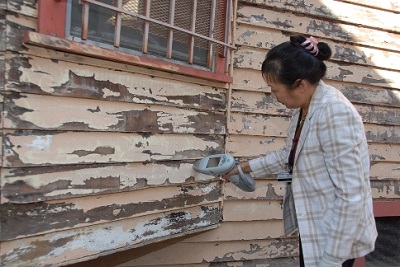Lead
For decades, we've known that exposure to high levels of lead can damage the nervous system in children, causing problems that range from hearing loss and seizures to unconsciousness and death. More recent research has demonstrated a link between even relatively low levels of exposure and a variety of subtle cognitive problems including learning disabilities and decreased intelligence.
Children are more sensitive to the harmful effects of lead than adults, because more of the lead they swallow gets into their bloodstream. Children also are at greater risk because they often play on the floor or ground, where lead-contaminated dust or soil is found. And they are much more likely than adults to put this material in their mouths.
Considerable efforts have been made to reduce children's exposure: Lead-based house paints have been banned since 1978, toy makers can no longer use lead-containing paints and the use of lead additives in gasoline has decreased.
In spite of these measures, it's estimated that nearly 250,000 American children under the age of 5 have abnormally high levels of lead in their blood.
There are several ways to protect your children against excessive exposure to lead:
Identify and eliminate any lead-based paint in your home
Many older homes-especially those built prior to 1978 still contain paint with high lead levels. Lead-based paint that is peeling or chipping is especially dangerous because young children may eat it. If you believe lead paint may be a problem, have your home inspected.
If you discover lead-based paint in your home, the best solution is to hire a certified abatement company to remove it. Never attempt to get rid of leaded paint yourself by scraping or sanding it; this creates large amounts of lead dust and can actually increase your risk of toxic exposure. If you're unable to afford professional abatement or it's impractical, a good alternative is to cover the painted surface with a durable, tough material like drywall or paneling. Simply painting or wallpapering over lead paint usually doesn't provide sufficient protection.
For a list of construction professionals in the Los Angeles area certified by the California Department of Public Health to perform lead-related work, contact the California Lead Poisoning Prevention Branch. Also refer the EPA's publication on how to Renovate Right- Important Lead Hazard Information for Families, Child Care Providers and Schools.
The places your children visit frequently, such as grandparents' homes and child care centers, should also be inspected for the presence of leaded paint.
Be sure lead levels are low in your drinking water
Public water supplies are checked regularly and by law must be kept at safe levels. Once the water reaches your home, however, lead levels can increase for a number of reasons. Lead-containing pipes in your home and pipes connected with lead solder can contaminate the water, as can faucets that contain lead.
To minimize the amount of lead that leaches into the water from these sources, use only cold water for cooking, drinking and making baby formula. And consider purchasing a water filter. Although filters vary greatly in their effectiveness against lead, a good one can dramatically reduce the amount of lead in your water.
Reduce exposure to contaminated dust and soil
Regularly wet mop floors and wipe down horizontal surfaces like tabletops and windowsills with a moist cloth. Also, encourage your children to wash their hands frequently, particularly before they eat or drink, to eliminate any lead-containing dust or soil that gets on them.
When children are outdoors, they should be discouraged from playing in areas with exposed soil
Bare areas in your yard should be planted with grass or ground covering or covered with wood chips or stones.
Talk to your children's pediatrician about the need for blood lead testing
tests show that your child's lead level is high, the source of the lead exposure must be identified and removed from the child's environment. This may be all that is necessary to correct the problem. If the child's blood lead levels are very high, special medications must be administered.
You May Be Interested In...
Links
- Lead Fact Sheet - Los Angeles County Department of Public Health
- Childhood Lead Poisoning and Prevention Program - Los Angeles County Department of Public Health
- Lead Hotline - The National Lead Information Center - U.S. Environmental Protection Agency
- ToxFAQsTM for Lead - Agency for Toxic Substances and Disease Registry
- Protect Your Family from Lead in Your Home - U.S. Environmental Protection Agency
- Lead Poisoning - U.S. National Library of Medicine and National Institutes of Health





